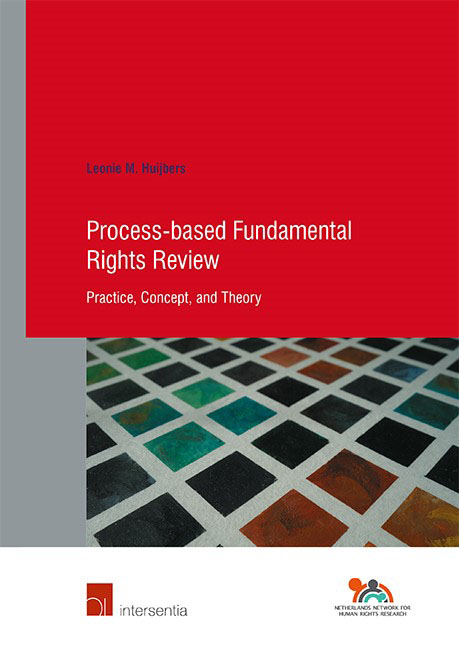Book contents
- Frontmatter
- Acknowledgments
- Contents
- List of Abbreviations
- INTRODUCTION
- PART I THE PRACTICE OF PROCESS-BASED FUNDAMENTAL RIGHTS REVIEW
- PART II THE CONCEPT OF PROCESS-BASED FUNDAMENTAL RIGHTS REVIEW
- PART III THE THEORY ON PROCESS-BASED FUNDAMENTAL RIGHTS REVIEW
- CONCLUSION
- Addendum: Questions for ECtHR Judges
- Summary
- Samenvatting
- Bibliography
- Official Documents
- Case-Law (by Jurisdiction)
- Case-Law (by Name)
- Curriculum vitae
- Human Rights Research Series
- Index
Introduction to Part III
Published online by Cambridge University Press: 11 November 2021
- Frontmatter
- Acknowledgments
- Contents
- List of Abbreviations
- INTRODUCTION
- PART I THE PRACTICE OF PROCESS-BASED FUNDAMENTAL RIGHTS REVIEW
- PART II THE CONCEPT OF PROCESS-BASED FUNDAMENTAL RIGHTS REVIEW
- PART III THE THEORY ON PROCESS-BASED FUNDAMENTAL RIGHTS REVIEW
- CONCLUSION
- Addendum: Questions for ECtHR Judges
- Summary
- Samenvatting
- Bibliography
- Official Documents
- Case-Law (by Jurisdiction)
- Case-Law (by Name)
- Curriculum vitae
- Human Rights Research Series
- Index
Summary
THE CONTROVERSY OF PROCESS-BASED FUNDAMENTAL RIGHTS REVIEW: SET-UP OF PART III
The previous Parts have clarified that process-based review is applied in fundamental rights cases and they have provided a conceptualisation of what procedural reasoning entails exactly, including the various ways in which it can work in practice. To reach an answer to this book's central question as to the role that process-based review can reasonably play in fundamental rights cases, however, it is important to take account of the debates surrounding this type of review. Indeed, as Section 1.1 indicated, the use of process-based review and its value are strongly debated, not just in scholarly writing, but also amongst judges. The debates concerning procedural reasoning are plenty and diverse, and they discuss the merits of process-based fundamental rights review from a variety of perspectives. Procedural reasoning is supported by philosophers – like Jurgen Habermas and John Hart Ely – and by legal scholars for reasons related to the roles of courts as procedural watchdogs and as institutions that enhance deliberation. Others, such as Laurence Tribe, have opposed the use of process-based review or have rejected the benefits of such an approach arguing that it would lead to reduced substantive protection of fundamental rights and it would foster judicial dishonesty.
This Part takes a closer look at these debates and provides a comprehensive review of the various arguments that have been advanced in favour of and against the use of procedural reasoning in fundamental rights cases. In addition, this Part aims to provide a deeper understanding of these debates by clarifying their complexities and their interconnectedness. In each chapter the underlying issues of the debates are therefore discussed. These debates inevitably have some overlap with traditional debates on judicial review more generally. After all, Chapter 5 showed that procedural and substantive reasoning are connected on a spectrum of judicial review. For that reason, and for reasons of clarity and structure, the following chapters are organised in light of three questions that take centre stage in constitutional debates generally: (1) What should courts not do? (2) What should courts do? And (3) What capacities do courts have? These questions overlap with the institutional position, function and expertise of courts. Before delving into the various debates, these three questions warrant a brief discussion.
- Type
- Chapter
- Information
- Process-based Fundamental Rights ReviewPractice, Concept, and Theory, pp. 177 - 182Publisher: IntersentiaPrint publication year: 2021

